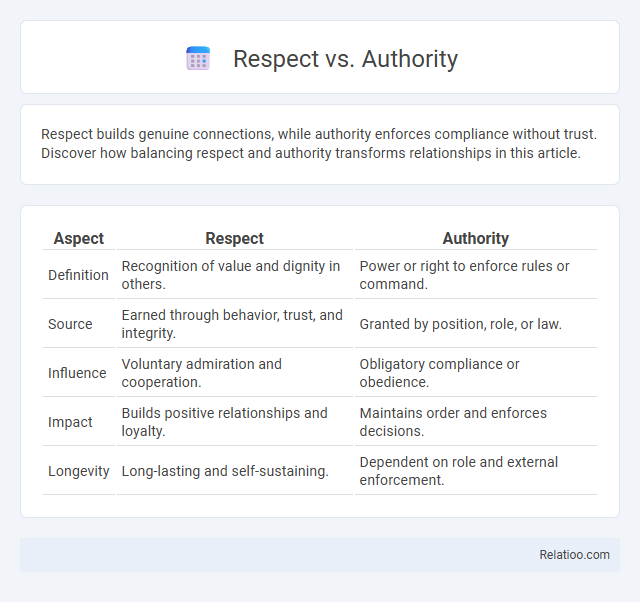Respect builds genuine connections, while authority enforces compliance without trust. Discover how balancing respect and authority transforms relationships in this article.
Table of Comparison
| Aspect | Respect | Authority |
|---|---|---|
| Definition | Recognition of value and dignity in others. | Power or right to enforce rules or command. |
| Source | Earned through behavior, trust, and integrity. | Granted by position, role, or law. |
| Influence | Voluntary admiration and cooperation. | Obligatory compliance or obedience. |
| Impact | Builds positive relationships and loyalty. | Maintains order and enforces decisions. |
| Longevity | Long-lasting and self-sustaining. | Dependent on role and external enforcement. |
Defining Respect and Authority
Respect involves recognizing the inherent value and dignity of others, fostering mutual understanding and positive relationships. Authority refers to the legitimate power or right to enforce rules, make decisions, and guide behavior within a structure or organization. Your ability to balance respect and authority is crucial in maintaining peaceful and constructive interactions.
The Roots of Authority
The roots of authority stem from recognized legitimacy, social contracts, and power structures embedded within cultural and institutional frameworks. Respect often arises naturally when authority is perceived as just, competent, and aligned with communal values, creating voluntary compliance rather than imposed control. Peacefulness is maintained through a balance where authority commands respect, preventing conflict and fostering social harmony by upholding fairness and order.
Types of Respect in Society
Respect in society manifests through various types, including authority-based respect, earned respect, and reciprocal respect, each playing a distinct role in social dynamics. Authority-based respect arises from recognized positions of power, such as leadership roles or institutional status, commanding obedience and compliance. Earned respect develops through personal qualities and achievements, fostering mutual admiration, while reciprocal respect nurtures peaceful coexistence by promoting empathy and understanding among individuals.
Authority Without Respect: A Flawed Model
Authority without respect creates a fragile dynamic prone to resistance and conflict, undermining effective leadership and social cohesion. When power is exercised solely through coercion or fear, compliance may be superficial, leading to instability and lack of genuine influence. Sustainable authority relies on mutual respect, fostering trust and cooperation that drive long-term peace and organizational success.
Respect Earned vs. Respect Demanded
Respect earned stems from genuine actions, trust, and integrity, fostering lasting relationships and authentic authority. Respect demanded may create compliance but often breeds resentment, undermining true leadership and peaceful environments. Your ability to inspire respect by example builds a foundation for harmony and sustainable influence.
Balancing Power and Dignity
Balancing power and dignity requires cultivating respect that acknowledges individual worth while maintaining legitimate authority to ensure order. Authority exercised with fairness fosters peaceful environments by preventing oppression and encouraging voluntary compliance. Emphasizing mutual respect preserves dignity, mitigates conflicts, and sustains harmonious power dynamics.
The Role of Leadership in Cultivating Respect
Effective leadership fosters respect by modeling integrity, empathy, and clear communication, which establishes a foundation of trust within teams and organizations. Leaders who prioritize respectful interactions encourage collaboration and reduce conflicts, directly contributing to a peaceful work environment. Authority exercised with fairness and accountability reinforces respect, ensuring that leadership inspires loyalty and promotes long-term organizational harmony.
Cultural Perspectives on Authority and Respect
Cultural perspectives on authority and respect vary significantly, shaping social interactions and governance structures around the world. In collectivist cultures such as Japan and China, respect for authority is deeply ingrained, often linked to hierarchical relationships and Confucian values emphasizing harmony and social order. Contrastingly, individualistic societies like the United States may prioritize questioning authority while valuing personal freedom, leading to different expressions of respect and peaceful coexistence.
Consequences of Disrespecting Authority
Disrespecting authority can lead to significant consequences, including loss of trust, increased conflict, and potential legal repercussions. Your actions might undermine social order and provoke a breakdown in communication, creating an environment of hostility and unrest. Maintaining respect for authority helps ensure peaceful interactions and contributes to a stable, cooperative society.
Building Mutual Respect in Hierarchical Structures
Building mutual respect in hierarchical structures requires recognizing the value of every individual's contribution while maintaining clear authority guidelines that foster trust and cooperation. You can enhance peacefulness by promoting open communication and ensuring that authority is exercised with fairness and empathy. Prioritizing respect over rigid control helps create a harmonious environment where collaboration thrives and conflicts are minimized.

Infographic: Respect vs Authority
 relatioo.com
relatioo.com